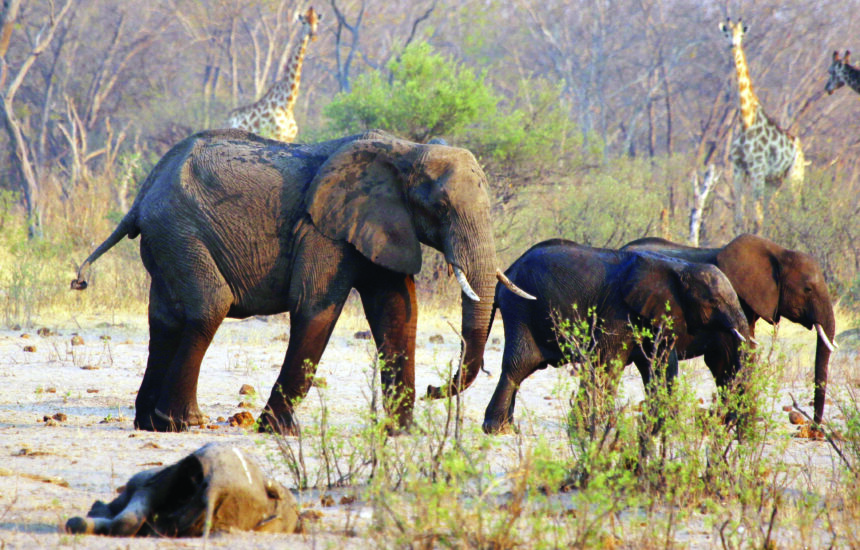The government has rejected what it terms sensationalised and negative framing surrounding its decision to cull over 700 wild animals, particularly by international media outlets CNN and BBC.
The government’s decision through the Environment and Tourism Ministry has been characterised by certain quarters as wanton disregard for conservation.
The government, however, is adamant that its decision was necessary to mitigate the negative impact of the ongoing drought on wildlife populations in both national parks and communal areas.
The government maintains that this is a proactive measure to manage grazing pressure and water scarcity, ensuring the long-term survival of wildlife in these challenging conditions.
Additionally, the environment and tourism ministry states that the cull will contribute to the drought relief programme by providing game meat to affected communities, demonstrating the government’s commitment to both conservation and the well-being of its people.
Tourism minister Pohamba Shifeta said the framing of the culling as solely a response to hunger, as highlighted by the BBC and CNN, oversimplifies a multifaceted issue.
“The international media’s sensationalised reporting not only undermines the Namibian government’s efforts, but also risks harming the country’s tourism industry, a vital source of revenue and employment,” he stated.
This approach reflects Namibia’s long-standing tradition of community-based conservation, which seeks to balance the intrinsic value of wildlife with the urgent needs of its people, particularly during times of environmental hardship, the seasoned politician added.
The BBC, in its reporting, states that “Namibia is to kill hundreds of wild animals, including elephants, to feed its hungry population.” Meanwhile, the CNN similarly emphasises the food insecurity angle, stating, “Namibia plans to cull 700 wild animals to provide food for its starving population.”
From Shifeta’s vantage point, both narratives must be rejected in totality.
“Those are ill-informed narratives, as the government’s decision to cull several animals is not taken unsustainably, but is rooted in scientific data and expert recommendations,” he observed.
“It is a carefully-calculated measure to ensure the long-term sustainability of both wildlife populations and human communities.”
Other reports have also suggested that Namibia is acting recklessly.
A case in point is a BBC article titled ‘Namibia’s Controversial Cull: Wildlife Sacrificed for Hunger’, while another by CNN reads ‘Namibia chooses food over fauna.’
“They must keep quiet. They are not more conservationists than us. They are more ignorant about the African wildlife population, particularly Namibia’s conservancy. Those animals are not being fed. They are roaming around, and sometimes get close to people. We are managing its population. If they don’t know, they must come learn from us,” Shifeta postulated.
Furthermore, he stressed that Namibia will never allow its resources to go to waste.
“We cannot allow our animals to die while our people are suffering. We will manage the population by sustainably reducing the number of wildlife,” he reiterated.
What is more, deputy information minister Modestus Amutse entered the fray, agreeing with Shifeta.
“The international media community does not understand the significance of the government’s decision due to their ignorance about Africa. Namibia has a huge number of wildlife, and has taken this decision to manage its population.
The government’s decision to cull a limited number of animals is not a sign of disregard for conservation, but rather a responsible approach to addressing complex challenges and ensuring a sustainable future for both people and wildlife”, said Amutse.
Ignorance
In addition, the environment ministry’s spokesperson Romeo Muyunda had another salvo for the international media.
“This is sensational reporting; they ignored the rationale and principle of this exercise. In our view, it’s a deliberate attempt to blow this situation out of proportion. These headlines insinuate that we are forgoing our wildlife to feed the hungry, as in fact, we are culling less than 1% of our wildlife population. The culling is also not primarily to feed the hungry, but to reduce the impact of drought on conservation as we continue to experience a shortage of grazing and water,” he asserted.
Muyunda said another justification is to reduce the frequency of human-wildlife conflict in the country.
“The provision of meat for drought relief is secondary. We urge and encourage global citizens to reject this type of sensational reporting,” he emphasised.
Culling
The ministry will avail 723 animals for culling.
This figure comprises 30 hippos, 60 buffalos, 50 impalas, 100 blue wildebeest, 300 zebras, 83 elephants and 100 elands.
The animals are sourced from national parks and communal areas with sustainable game numbers.
The culling will be conducted by professional hunters and safari outfitters contracted by the ministry and conservancies in specific areas, Muyunda noted.
To date, 157 animals comprising different species were hunted, delivering 56 875 kilogrammes of meat in the process.


